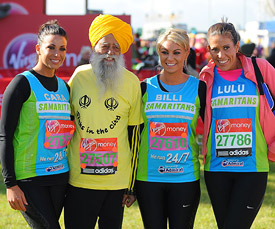Fauja agreed to run the London Marathon again the next spring. He ran his third-fastest time ever, 6:07. He was back. Now Haramander approached Fauja with another proposal. "You've already set every marathon record you possibly can. There's only one left to break, the record for the oldest marathoner ever." At the time, that record was held by Dimitrion Yordanidis, who ran the original marathon course, from Marathon, Greece, to Athens, in 1976. Yordanidis had been 98. Fauja was 93. "You can't break that record now," Harmander said. "All you can do is wait."
So Fauja waited, running shorter races to fill his time. Then, in April 2011, his 100th birthday arrived, and with it, an opportunity to break the record. Soon he received an invitation from the Toronto Waterfront Marathon, where years ago Fauja had run his fastest time. He accepted.
The race was set for October. In September, Harmander received an email from Vin Sharma, a London-based Global Talent Manager at Guinness. "What would be great," Sharma wrote, "is to start by acknowledging 'Oldest Marathon Runner' title which rightfully belongs to Fauja-ji." (Ji is an honorific suffix used in Indian languages.)
“He'd used running to pull himself out of the depression he fell into after his son died. What was he going to do without it? ”
- Harmander Singh
The email from Sharma continued: "Birth certificate or passport to verify his age would also be useful." Fauja, of course, did not have a birth certificate. But he did have a passport. He'd gotten his first when he visited his children abroad, decades prior. On that passport, and on each one he'd received since, there was listed the same date of birth: April 1, 1911.
Sharma attached a document with official guidelines for the record. "Where a birth certificate is not available," it said, "a copy of a relevant ID should be submitted."
They submitted the documents, and weeks later they flew to Toronto. Fauja finished in 8:25. In his mind, and in the minds of everyone present at the race, Fauja had done what no man had done before.
"100-YEAR-OLD MARATHON RUNNER not recognised by Guinness," read the BBC News headline after the event. In an interview with the network, Guinness editor-in-chief Craig Glenday said, "We would love to give him the record. We'd love to say this is a true Guinness World Record, but the problem is there is just no evidence."
By no evidence, Glenday meant that there was no birth certificate. "We can only accept official birth documents created in the year of the birth," Glenday told the BBC. "Anything else is really not very useful to us." In September, a Guinness representative had sent guidelines suggesting a passport would be sufficient. Now in October, the company said only a birth certificate would do. It didn't matter that Fauja had received his first passport before he began running, negating any significant possibility of a plot to break the record. Nor did it matter what the Guinness official had told Harmander.

Cara Kilbey, Fauja Singh, Billi Mucklow and their friend Lulu pose for a photo during the London Marathon in April 2012.
Christopher Lee/Getty Images
"This is a case of institutional racism," Harmander said, after learning of the news. The thinking was simple. Guinness had decided its age records could be held only by people with birth certificates. The vast majority of people with birth certificates in the early 20th century came from Europe or North America. Fauja could not have the record. And for that matter, neither could most anyone else from Asia or Africa or other parts of the developing world.
Now came the follow-up stories. "Marathon man Fauja Singh runs into racism row," said the headline in London's conservative paper, The Daily Telegraph. Members of the Sikh community, both at home in Punjab and across the diaspora, signed a petition and set the Internet aflame with angry comments. "BROWN PEOPLE OF TUMBLR," one person wrote on the popular blogging platform about Singh, "I SUMMON YOU TO RIGHT THE WRONGS. TO BRING JUSTICE TO THE INJUSTICES."
Yet it would do no good. Guinness remained firm. "Passports may be used as proof of identification, NOT of birth. …" Guinness spokeswoman Jamie Panas wrote to ESPN The Magazine in an email. " … Passports and other mid-to-late-life representations of age are notoriously unreliable when unaccompanied by original proofs of birth." Panas emphasized that Guinness never guaranteed that a passport would be sufficient. She also said that Sharma, the Guinness talent manager who advised Harmander, is no longer with the company. Sharma could not be reached for comment. His personal website says he left Guinness at some point last year.
No comments:
Post a Comment